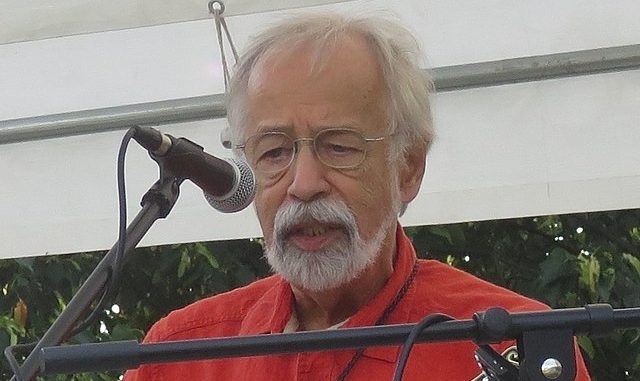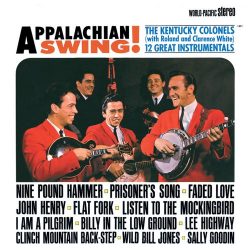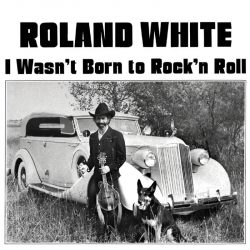
Bluegrass and country rock legend Roland White wasn’t born to rock’n’roll.
Legend can sometimes be an overused term when discussing musicians, but it perfectly describes bluegrass mandolinist Roland White who sadly died on April 1st. Over a career of nearly seventy years, he was a member of two seminal bands who had a direct influence on the development of country rock and ultimately americana, as well as a very successful career as a bluegrass elder statesman, tutor, and ambassador. Roland White was also that rare breed of musician who could easily span the worlds of traditional and progressive bluegrass, and therefore had a significant role in ensuring the bluegrass genre continued to develop into the 21st Century.
Roland White was born Roland LeBlanc on 23rd April 1938, in Madawaska, Maine to a musical French  Canadian family who subsequently changed their name to White. The family moved to Burbank, California in 1954, and Roland White formed a family group the Three Little Country Boys with his brothers Clarence on guitar and Eric Jnr on banjo. The group initially played country music but Roland moved them in the bluegrass direction, and when they changed their name to the Kentucky Colonels history was about to be made. Roland White was drafted into the army and returned to record 1964’s ‘Appalachian Swing’ which has become a definitive bluegrass album thanks to Clarence White’s prominent guitar work, and the Kentucky Colonels had changed the sound of bluegrass. The Kentucky Colonels broke up in 1967 with Clarence White doing more session work on electric guitar before joining the Byrds, but Roland White continued his bluegrass education by joining originator Bill Monroe’s Blue Grass Boys, and he subsequently joined Lester Flatt’s Nashville Grass in 1969.
Canadian family who subsequently changed their name to White. The family moved to Burbank, California in 1954, and Roland White formed a family group the Three Little Country Boys with his brothers Clarence on guitar and Eric Jnr on banjo. The group initially played country music but Roland moved them in the bluegrass direction, and when they changed their name to the Kentucky Colonels history was about to be made. Roland White was drafted into the army and returned to record 1964’s ‘Appalachian Swing’ which has become a definitive bluegrass album thanks to Clarence White’s prominent guitar work, and the Kentucky Colonels had changed the sound of bluegrass. The Kentucky Colonels broke up in 1967 with Clarence White doing more session work on electric guitar before joining the Byrds, but Roland White continued his bluegrass education by joining originator Bill Monroe’s Blue Grass Boys, and he subsequently joined Lester Flatt’s Nashville Grass in 1969.
After Clarence White left the Byrds he got in touch with Roland and Eric White about getting the Kentucky Colonels back together again. With Alan Munde or Herb Pedersen on banjo, the White Brothers aka the New Kentucky Colonels played a European tour taking in Sweden, the Netherlands, and England in 1973. It was after the band returned to the United States that Clarence White was killed by a drunken driver when he was loading his equipment after a gig with the New Kentucky Colonels in Palmdale, California. The recent archive recordings ‘Live In Sweden 1973’ and ‘Live In Holland 1973’ show for posterity what a great group this was, and Roland White is heavily featured on lead vocals and mandolin. Roland White then joined Byron Berline’s Country Gazette in 1974, bringing his lead vocals and guitar as well as mandolin to the band he stayed with until 1987. Country Gazette had grown out of the Dillard & Clark and they mixed bluegrass with country rock and were a big influence on ‘70s newgrass bands. Roland White recorded his first solo album ‘I Wasn’t Born To Rock’n’Roll’ in 1976, and this was really a Country Gazette record but with a heavy dose of traditional material. It also has one of the great album covers of the ‘70s, and though it was not a commercial success at the time, its legendary status led to its re-release in 2010 on Tompkins Square.
He joined the Nashville Bluegrass Band in 1989 on mandolin and vocals and won two Grammy awards with them. Though the Nashville Bluegrass Band was made up of Nashville bluegrass players and they knew how to play traditional bluegrass, they were also innovative with their mix of black vocal traditions and use of contemporary material. The band were also bluegrass ambassadors touring the world, including China, with state-sponsored tours. Roland White released a second solo album in 1994, ‘Trying To Get To You’, and released three more albums, 2003’s ‘Jelly On My Tofu’, 2014’s ‘Straight Ahead Bluegrass’, and 2018’s ‘A Tribute To The Kentucky Colonels’. He continued to play sessions and ensured the art of bluegrass mandolin was passed on to the next generation through his various tutorials.
While Roland White certainly contributed to the development of country rock through the influence of  the Kentucky Colonels and Country Gazette, his love was always bluegrass and in that sense, his 1976 solo album was absolutely true. He had seen from a distance the rock and roll lifestyle enjoyed by his brother Clarence during his time with the Byrds but didn’t want it. The fact that Clarence White himself wanted to resurrect the Kentucky Colonels could have been a sign he wanted to return to his first musical love, and leave the madness of the early ‘70s rock music. Roland White in his own imitable way strengthened and developed bluegrass by melding the old with the new in a way that seemed perfectly natural. He was not only a Grammy award winner, but a member of the International Bluegrass Hall of Fame, and when Ry Cooder was looking for a mandolinist and sometime vocalist to accompany him on ‘My Name Is Buddy’ he gave Roland White a call. While Roland White will be sorely missed by his wife and musical partner Diane Bouska, and his family and friends, his musical legacy is assured by the significant achievements of his lifelong career. He definitely made a difference to his chosen musical genre.
the Kentucky Colonels and Country Gazette, his love was always bluegrass and in that sense, his 1976 solo album was absolutely true. He had seen from a distance the rock and roll lifestyle enjoyed by his brother Clarence during his time with the Byrds but didn’t want it. The fact that Clarence White himself wanted to resurrect the Kentucky Colonels could have been a sign he wanted to return to his first musical love, and leave the madness of the early ‘70s rock music. Roland White in his own imitable way strengthened and developed bluegrass by melding the old with the new in a way that seemed perfectly natural. He was not only a Grammy award winner, but a member of the International Bluegrass Hall of Fame, and when Ry Cooder was looking for a mandolinist and sometime vocalist to accompany him on ‘My Name Is Buddy’ he gave Roland White a call. While Roland White will be sorely missed by his wife and musical partner Diane Bouska, and his family and friends, his musical legacy is assured by the significant achievements of his lifelong career. He definitely made a difference to his chosen musical genre.



Thanks for a really nice piece about, as you say, a true legend. ‘A Tribute To The Kentucky Colonels’ showed his appreciation of the modern state of Bluegrass, featuring next generation stars like Brittany Haas, Molly Tuttle and Billy Strings amongst others.
I also have an album, The Dreadful Snakes, featuring an extremely youthful Bela Fleck and Jerry Douglas, released on Rounder in 1983. Roland was clearly a a big link in the bluegrass chain.
He will be sadly missed and did so much for bluegrass. As you say Jeremy, the Dreadful Snakes album is a great listen, great players doing it for enjoyment, but still a link in the modern bluegrass chain.